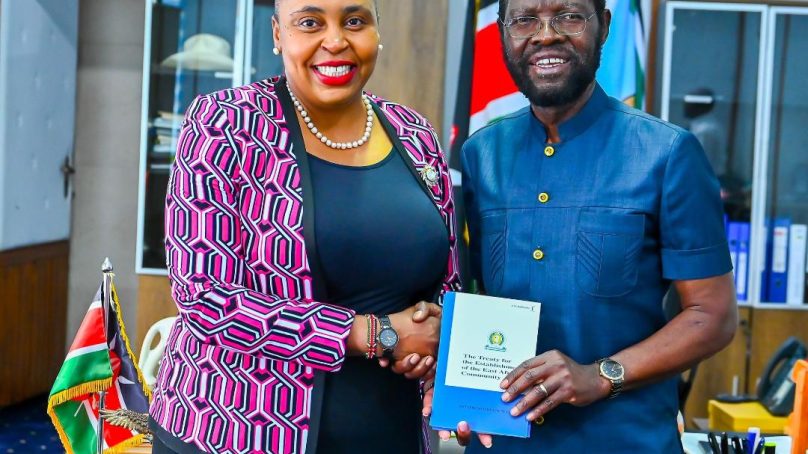
Kenya plans to establish a Jumuiya Market in Kisumu to strengthen cross-border trade in East African Community (EAC) and connect local traders to other regional markets.
East African Community Affairs Principal Secretary Carolyn Karugu said the flagship initiative under her department targets EAC’s roughly 300 million consumers, positioning Kisumu as a dispersal point of goods and services to the region’s growing trade opportunities.
Speaking during a courtesy call on Kisumu Governor Anyang’ Nyong’o, Karugu said EAC currently accounts for 29 per cent of Kenya’s total trade, making it the country’s largest trading bloc.
“Our mandate as a state department is to broaden this trade space, so we don’t have to worry only about markets in China and Europe, while we have a readily accessible market here in East Africa,” Karugu said.
The project’s first phase, which is already underway, she said, entails a feasibility and market assessment study to identify viable products, trade volumes, and preferred markets across the region.
“We are initiating a feasibility study and market assessment today. Within about a month, we should be ready with the findings,” said Karugu, noting that the team will work with existing initiatives to enhance outcomes.
She described Kisumu as a strategic choice for the pilot phase of the initiative, citing its connectivity by road, lake and air, and its historical role in regional commerce.
“Kisumu is accessible by road, air and water. It is linked to Uganda and Tanzania through Lake Victoria and is poised to become the Dubai of East Africa,” she added.
The Jumuiya Market, she said, will be integrated with Kisumu’s County Aggregation and Industrial Parks to create a seamless supply chain for locally processed products reaching regional markets.
She added that the initiative aims to build trader capacity through training on cross-border trade protocols, including the EAC Treaty, rules of origin, and market requirements. Karugu said the Identified traders will be trained and facilitated to travel to key cities across the region including Dar es Salaam, Kigali and Kinshasa for exposure and networking with their counterparts.
“This will open them to new trading opportunities and enable them to venture into value addition and development of market-specific products,” she said.
She disclosed that insights from the Kisumu pilot will inform the rollout of the initiative in the remaining 46 counties to create a wider reach for Kenyan products across the EAC region. Plans, she said, were underway to establish trade accelerator hubs in major East African cities, including Kisumu, to support Kenyan traders launching operations in neighbouring countries.
“These will allow our traders to scale and begin trade activities directly in other countries in the region,” she said.
Karugu clarified that the project does not necessarily involve building new markets adding that the feasibility study will assess whether existing markets such as Kibuye, Uhuru or Jubilee can host the Jumuiya Market operations.
“We want to make sure all our markets are fully utilised. It’s too early to say which one we’ll settle on. The study will guide us,” she said.
Access to finance is also central to the project, she said, with the state department engaging banks, telcos and other financial institutions to unlock credit for participating traders.
“We are also looking at existing financial instruments such as the Hustler Fund. Capital access is essential and we will announce our partners once the exploratory phase is done,” she added.
Governor Nyong’o welcomed the initiative, saying it aligns with the county’s vision to transform Kisumu into a regional trade hub.
“We are, of course, interested in visiting the markets in Kisumu and knowing the patterns of trade in the region. This is a preparatory visit for a much more extended study, which will inform the State Department of East African Community in establishing the Jumuiya Market,” he said.
He reaffirmed the county’s commitment to supporting the project and working closely with the national government to ground the trade framework in local realities.
“Our markets such as Kibuye and Uhuru are economic nerve centres, and any successful regional trade initiative must be anchored in how these markets function,” he said.
- A Tell Media / KNA report / By Chris Mahandara
East African Community Affairs Principal Secretary Carolyn Karugu (left) and Kisumu Governor Prof Anyang Nyong’o when she paid a courtesy call to the governor to brief him on the in Jumuiya Market initiative which is being piloted in Kisumu. Credit: Chris Mahandara








